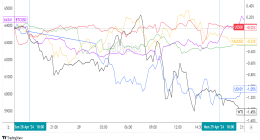Democracy has been threatened by commercialising the swift spread of controversy and lies for political advantage
Donald Trump’s incitement of a mob attack on the US Capitol was a watershed moment for free speech and the internet. Bans against both the US president and his prominent supporters have spread across social media as well as email and e-commerce services. Parler, a social network popular with neo-Nazis, was ditched from mobile phone app stores and then forced offline entirely. These events suggest that the most momentous year of modern democracy was not 1989 – when the Berlin wall fell – but 1991, when web servers first became publicly available.
There are two related issues at stake here: the chilling power afforded to huge US corporations to limit free speech; and the vast sums they make from algorithmically privileging and amplifying deliberate disinformation. The doctrines, regulations and laws that govern the web were constructed to foster growth in an immature sector. But the industry has grown into a monster – one which threatens democracy by commercialising the swift spread of controversy and lies for political advantage.




